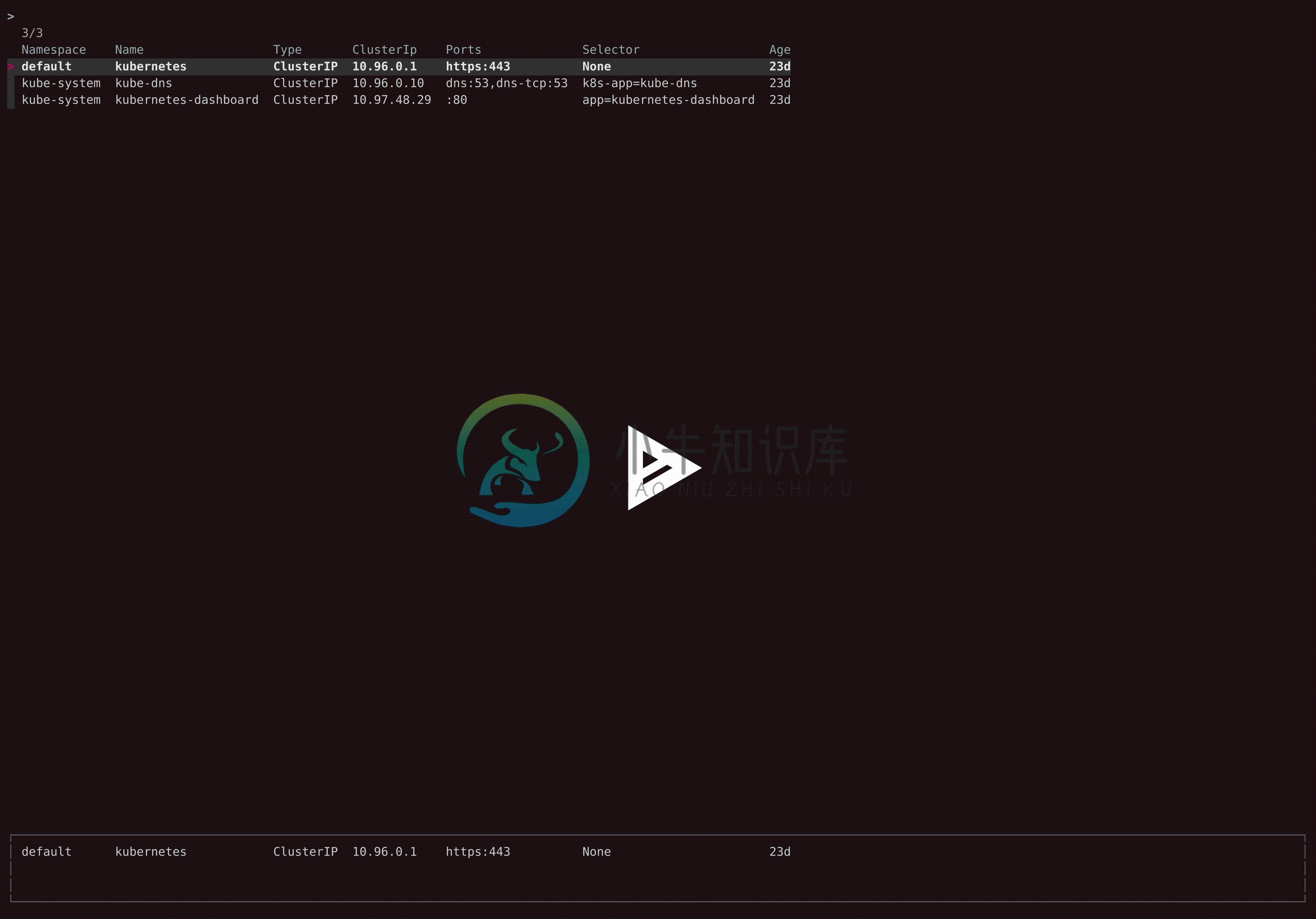Kubectl-fzf
kubectl-fzf provides a fast and powerful fzf autocompletion for kubectl.
Table of Contents
Features
- Seamless integration with kubectl autocompletion
- Sub second completion
- Label autocompletion
- Automatic namespace switch
Requirements
- go (minimum version 1.12)
- fzf
Installation
Cache builder
Local installation
Install cache_builder:
# Mac
FILE="kubectl-fzf_darwin_amd64.tar.gz"
# Linux
FILE="kubectl-fzf_linux_amd64.tar.gz"
cd /tmp
wget "https://github.com/bonnefoa/kubectl-fzf/releases/latest/download/$FILE"
tar -xf $FILE
install cache_builder ~/local/bin/cache_builder
As a kubernetes deployment
You can deploy the cache builder as a pod in your cluster.
helm template --namespace myns --set image.cache_builder.tag=1.0.11 --set toleration=aToleration . | kubectl apply -f -
You can check the latest image version here.
Shell autocompletion
Source the autocompletion functions:
# kubectl_fzf.sh needs to be sourced after kubectl completion.
# bash version
wget https://raw.githubusercontent.com/bonnefoa/kubectl-fzf/master/kubectl_fzf.sh -O ~/.kubectl_fzf.sh
echo "source <(kubectl completion bash)" >> ~/.bashrc
echo "source ~/.kubectl_fzf.sh" >> ~/.bashrc
# zsh version
wget https://raw.githubusercontent.com/bonnefoa/kubectl-fzf/master/kubectl_fzf.plugin.zsh -O ~/.kubectl_fzf.plugin.zsh
echo "source <(kubectl completion zsh)" >> ~/.zshrc
echo "source ~/.kubectl_fzf.plugin.zsh" >> ~/.zshrc
Using zplug
You can use zplug to install the autocompletion functions
zplug "plugins/kubectl", from:oh-my-zsh, defer:2
zplug "bonnefoa/kubectl-fzf", defer:3
Usage
cache_builder: local version
cache_builder will watch cluster resources and keep the current state of the cluster in local files.By default, files are written in /tmp/kubectl_fzf_cache (defined by KUBECTL_FZF_CACHE)
To create cache files necessary for kubectl_fzf, just run in a tmux or a screen
cache_builder
It will watch the cluster in the current context. If you switch context, cache_builder will detect and start watching the new cluster.The initial resource listing can be long on big clusters and autocompletion might need 30s+.
connect: connection refused or similar messages are expected if there's network issues/interruptions and cache_builder will automatically reconnect.
Configuration
You can configure cache_builder with the configuration file $HOME/.kubectl_fzf.yaml
# Role to hide from the role list in node completion
role-blacklist:
- common-node
# Namespaces to exclude for configmap and pod listing
# Regexps are accepted
excluded-namespaces:
- consul-agent
- datadog-agent
- coredns
- kube-system
- kube2iam
- dev-.*
Advantages
- Minimal setup needed.
Drawbacks
- It can be CPU and memory intensive on big clusters
- It also can be bandwidth intensive. The most expensive is the initial listing at startup and on error/disconnection. Big namespace can increase the probability of errors during initial listing.
cache_builder: pod version
If the pod is deployed in your cluster, the autocompletion fetch the cache files from the pod using rsync.
To check if you can reach the pod, try:
IP=$(k get endpoints -l app=kubectl-fzf --all-namespaces -o=jsonpath='{.items[*].subsets[*].addresses[*].ip}')
nc -v -z $IP 80
By default, it will use the port 80.You can change it by deploying the chart with a different port value and using KUBECTL_FZF_RSYNC_PORT:
helm template --namespace myns --set port=873 . | kubectl apply -f -
export KUBECTL_FZF_RSYNC_PORT=873
If there's no direct access, a port-forward will be opened.Opening a port-forward can take several seconds and thus, slow the autocompletion.If you want to avoid this, you can keep the open_port_forward.sh script running which will keep the port-forward opened.
Advantages
- No need to run a local
cache_builder - Bandwidth usage is limited to the rsync transfert which is low.
Drawbacks
- Rsynced resources are cached for 30 seconds so the autocompletion can get outdated.
kubectl_fzf
Once cache_builder is running, you will be able to use kubectl_fzf by calling the kubectl completion
kubectl get pod <TAB>
Options
| Environment variable | Description | Default |
|---|---|---|
| KUBECTL_FZF_CACHE | Cache files location | /tmp/kubectl_fzf_cache |
| KUBECTL_FZF_EXCLUDE | Exclusion patterns passed to the autocompletion | "" |
| KUBECTL_FZF_OPTIONS | fzf parameters | -1 --header-lines=2 --layout reverse -e --no-hscroll --no-sort |
To turn down exact match in search:
export KUBECTL_FZF_OPTIONS=(-1 --header-lines=2 --layout reverse)
To enable hscroll
export KUBECTL_FZF_OPTIONS=(-1 --header-lines=2 --layout reverse -e)
To bind space to accept current result (You can check the list of available keys and actions in the fzf man)
export KUBECTL_FZF_OPTIONS=(-1 --header-lines=2 --layout reverse -e --no-hscroll --no-sort --bind space:accept)
To exclude all namespaces starting with "dev" and consul-agent resources:
export KUBECTL_FZF_EXCLUDE=("^dev" "consul-agent")
Caveats
With zsh, if the suggested completion doesn't match the start of the query, the completion will fail.
k get pod pr<TAB>
# result needs to start with `pr` otherwise autocompletion will fail
If you're using an out-of-the-box oh-my-zsh configuration, the default matcher-list zstyle (zstyle ':completion:*' matcher-list 'r:|=*' 'l:|=* r:|=*') will interfere with the search. If fzf does not find any match, or if you interrupt it by pressing Esc or Ctrl-C/Cmd-C, zsh will see it as a failed completion and will restart it again.
Changing the zstyle to zstyle ':completion:*' matcher-list 'r:|=*' fixes the issue.
Troubleshooting
Debug logs
To launch cache_builder with debug logs
cache_builder -logtostderr -v 14
The normal autocompletion is used
First, check if cache files are correctly generated in /tmp/kubectl_fzf_cache.The autocompletion will fallback to normal method if cache files are absent.
If the files are present, check that the __kubectl_get_containers is correctly overloaded
# Incorrect type
type __kubectl_get_containers
__kubectl_get_containers is a shell function from /dev/fd/15
# Expected output
type __kubectl_get_containers
__kubectl_get_containers is a shell function from .../kubectl-fzf/kubectl_fzf.plugin.zsh
Be sure that kubectl_fzf.plugin is loaded after kubectl completion zsh in your bashrc/zshrc.
-
kubectl-slice 是一个 CLI 工具,可以通过规则将包含多个对象资源的 Kubernetes 配置清单切割成多个 YAML 文件。 例如下面的配置清单: apiVersion: v1kind: Podmetadata: name: nginx-ingress---apiVersion: v1kind: Namespacemetadata: name: production 通过 k
-
kubectl-trace 是一个 kubectl 插件,它可以使用基于 bpftrace 的编程能力,来分析系统的性能问题。你只需编写好程序文件,就可以通过这个插件将其运行到 K8s 集群中,不需要任何额外工作。 架构
-
kubectl-aliases This repository contains a script to generate hundreds ofconvenient shell aliases for kubectl, so you no longer need to spell out every singlecommand and --flag over and over again. An
-
Kubectl-debug 简体中文 Overview kubectl-debug is an out-of-tree solution for troubleshooting running pods, which allows you to run a new container in running pods for debugging purpose (examples). The new
-
kubectl-alias是一个可以帮助你在kubectl上添加常用别名(alias)的插件。 使用示例 # "v" for versionkubectl alias v versionkubectl v --client 安装 Homebrew 安装Homebrew。 brew install predatorray/brew/kubectl-alias 将下面一行添加到rc文件中。 expor
-
null 我的问题是 为什么在一个集群中有三个操作来执行相同的任务? 这些操作的用例是什么? 他们在引擎盖下有什么不同?


